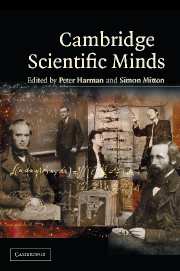Book contents
- Frontmatter
- Contents
- Foreword
- Introduction
- 1 William Gilbert
- 2 William Harvey
- 3 Isaac Newton: Creator of the Cambridge scientific tradition
- 4 William Whewell: A Cambridge historian and philosopher of science
- 5 Adam Sedgwick: A confident mind in turmoil
- 6 Charles Babbage: Science and reform
- 7 Charles Darwin
- 8 Stokes and Kelvin, Cambridge and Glasgow, light and heat
- 9 James Clerk Maxwell
- 10 The duo from Trinity: A.N. Whitehead and Bertrand Russell on the foundations of mathematics, 1895–1925
- 11 Thomson, Rutherford and atomic physics at the Cavendish
- 12 Hopkins and biochemistry
- 13 Charles Sherrington, E.D. Adrian, and Henry Dale: The Cambridge Physiological Laboratory and the physiology of the nervous system
- 14 Hardy and Littlewood
- 15 Arthur Stanley Eddington
- 16 Paul Dirac: A quantum genius
- 17 Alan Turing
- 18 Francis Crick and James Watson
- 19 Mary Cartwright
- 20 Joseph Needham
- 21 Molecular biology in Cambridge
- 22 The discovery of pulsars – prelude and aftermath
- 23 Stephen W. Hawking
20 - Joseph Needham
Published online by Cambridge University Press: 05 June 2014
- Frontmatter
- Contents
- Foreword
- Introduction
- 1 William Gilbert
- 2 William Harvey
- 3 Isaac Newton: Creator of the Cambridge scientific tradition
- 4 William Whewell: A Cambridge historian and philosopher of science
- 5 Adam Sedgwick: A confident mind in turmoil
- 6 Charles Babbage: Science and reform
- 7 Charles Darwin
- 8 Stokes and Kelvin, Cambridge and Glasgow, light and heat
- 9 James Clerk Maxwell
- 10 The duo from Trinity: A.N. Whitehead and Bertrand Russell on the foundations of mathematics, 1895–1925
- 11 Thomson, Rutherford and atomic physics at the Cavendish
- 12 Hopkins and biochemistry
- 13 Charles Sherrington, E.D. Adrian, and Henry Dale: The Cambridge Physiological Laboratory and the physiology of the nervous system
- 14 Hardy and Littlewood
- 15 Arthur Stanley Eddington
- 16 Paul Dirac: A quantum genius
- 17 Alan Turing
- 18 Francis Crick and James Watson
- 19 Mary Cartwright
- 20 Joseph Needham
- 21 Molecular biology in Cambridge
- 22 The discovery of pulsars – prelude and aftermath
- 23 Stephen W. Hawking
Summary
After winning acclaim for his monumental work on the history of Chinese science, Joseph Needham was occasionally introduced to fellow scientists who expressed appreciation for what they took to be his father–s pioneering research on chemical embryology. The two women central to his adult life – his first wife Dorothy, and his long¬time collaborator and eventual second wife Lu Gwei-Djen – used to enjoy recalling the surprise on the face of new acquaintances when they realised the biochemist and the sinologist were the same man. Like A.N. Whitehead, whose philosophical views and breadth of outlook he absorbed as a young man, Needham made the history of science his priority only after first gaining a reputation as an innovative scientific researcher. His later orientation was nevertheless solidly grounded in sensibilities he cultivated from youth.
Joseph Needham was born in London in December 1900. Looking back on his life in the 1970s, he accounted for the distinctive features of his character in terms of the influence of his parents. His tendency to embark on expansive projects he saw as reflecting the artistic temperament of his Irish songwriter mother, while his scientific propensities and broad religious interests he ascribed to his English father, a physician of Anglo-Catholic conviction and Gallophile tastes. Like George Bernard Shaw, one of his youthful culture heroes, Needham later explained his creativity, and particularly his abiding desire to build bridges between various areas of interest, as the consequence of a desire to reconcile parents whose personalities and opinions often clashed.
- Type
- Chapter
- Information
- Cambridge Scientific Minds , pp. 299 - 312Publisher: Cambridge University PressPrint publication year: 2002
- 1
- Cited by



